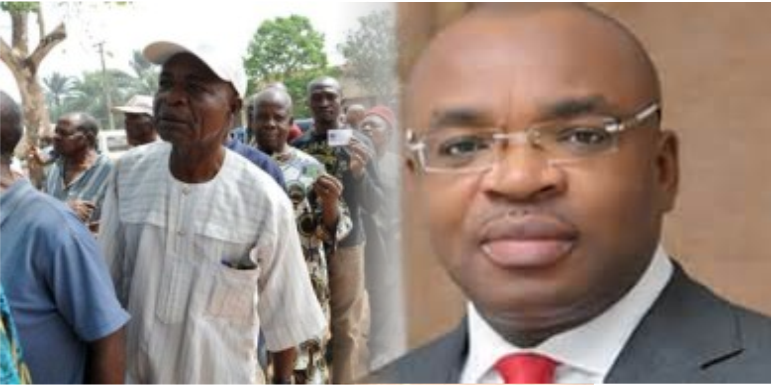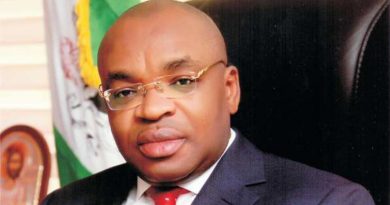Akwa Ibom Tribunal: APC and their crumbled witneses in the eyes of the storm
Edward Israel-Ayide
On the 28th of August 2015, the APC and its gubernatorial candidate in the recently concluded governorship polls in Akwa Ibom, Umana Okon Umana, concluded their case before the Akwa Ibom Election Tribunal sitting in Abuja. Their case which was hinged on the account that no elections were held in Akwa Ibom, had as chief witnesses Umana Okon Umana, Chief Obong Attah, formerly of the PDP, former Petroleum Minister Atuekong Etiebet, and expert witnesses that were brought in for forensic analysis of election materials.
My first major contact with the tribunal was on the invitation of a friend who wanted me to see beyond the “trial reporting” that was being carried out by the APC on social media. On his invitation, I sat in court to listen to the testimony of the public witnesses brought in by the APC to support its case that no elections were held in Akwa Ibom. It wasn’t too long before these witnesses began to crumble under cross-examination, first under questions from the PDP legal team led by Mr Tayo Oyetibo, (SAN), counsel to the Akwa Ibom State Governor, Mr paul Usoro (SAN), and counsel to the INEC Dr Onyiechi Ikpeazu (SAN).
From the testimony of the public witnesses, it became clear to me that the witness statements adopted by their witnesses and sworn to under oath would never tally with their testimony in open court. Most, upon scrutiny by the counsel to the respondents, turned out to have been based on hearsay reports gleaned from agents of the APC Situation room, or were the testimonies of aggrieved former PDP members who obviously were sore that they had been passed over for appointments under the PDP.
On the 22nd of July, APC gubernatorial candidate, Umana Okon Umana, sat in court while an APC witness, Engineer Emmanuel Alfred turned the APC case on its head by admitting that there were elections in Akwa Ibom, and that he personally took part by voting. When counsel to the People’s Democratic Party, Mr Tayo Oyetibo, SAN pointed out to him that his testimony in court was in contradiction to the sworn affidavit that he had adopted before the tribunal, Engineer Emmanuel informed Oyetibo and the tribunal that the affidavit was prepared by the APC legal team.
As far as he was concerned, there was an election and he voted. His position was further corroborated by the testimony of another APC witness upon cross-examination; Nkereuwem Okpok informed the tribunal that INEC distributed election materials on Friday before the elections in his Local Government Area, and that he participated in the election by voting.
Throughout the duration of the petitioner’s (APC) case, there were loud proclamations on social media that a star witness was being presented to the tribunal; with each news of this, my hopes got raised that perhaps the APC would now present witnesses who would testify to have been in collusion with the PDP to rig the election, or unleash mayhem on the state.
At each point, I was left confused. The first “star witness” Atuekong Etiebet’s request to tender some newspaper and video evidence he claimed were made during and after the elections was denied by the tribunal. Counsel to the Governor of Akwa Ibom State, Paul Usoro, SAN had strongly objected to the admissibility of such documents by the Court claiming that they did not meet the basic ingredients of the law for them to be admitted by the Tribunal.
According to Mr. Usoro, such material needed to have been mentioned and pleaded in the witness’s statement before they could be admitted, a key point the APC legal team seemed to have overlooked. The Justice Umar led tribunal agreed that this “evidence” did not meet legal requirements, and summarily threw them out.
Atuekong Etiebet had also toed the APC line by stating that no elections held in his polling unit, and that he had made a video of this, which he sought to present to the court as evidence. An interesting side note however is that a few days earlier, Etiebet’s nephew, Okokon Etiebet who shares the same polling unit with the former Chairman of the All Nigeria Peoples Party, ANPP, and who had testified as a witness of the APC, accepted that elections actually took place in his polling unit and ward.
There was no respite for the APC as well with the much advertised testimony of Chief Obong Attah, who like Etiebet based his case on video evidence he claimed to have. Upon examination, it became obvious that there was no indication as to the date the video recording was made, making some members of the tribunal audience joke that the video could have been prepared as a plan B in case the elections did not go the way of the APC, and the crowd who stood by him could have been hired to give it some credibility.
Both Atuekong Etiebet and Obong Attah revealed upon cross-examination that their stories of no election in Akwa Ibom State were based on reports from field agents, as they were confined to their polling units on Election Day since they did not have the necessary accreditation to move about and see what was taking place in other units. Their reports of widespread violence, mayhem, harassment of electoral officers and election rigging were thus based on hearsay reports.
Throughout the APC’s case, the only thing I could glean from the proceedings was that the APC knew that it really did not have a water-tight case to request that the Akwa Ibom gubernatorial elections be cancelled, but only wanted to cast a shadow over the mandate of the Governor Udom Emmanuel. The fact that the APC continuously sang the “there was no election” song but accepted the victory of APC candidate representing Orue Offong Oruko State Constituency which was conducted on the same day helped to fuel this theory.
It is certain that at the end of the case, the trio of Justices A.S. Umar, K.O. Dawodu and P. T. Kwahar will declare their ruling based on the evidence presented before them; devoid of any influence from any quarters. I am certain as well that whatever their ruling, the good people of Akwa Ibom will accept this as the voice of the law regarding the elections in the state, and support their governor to bring his plans for the state to fruition.
The respondents (PDP, Governor Udom Emmanuel and INEC) begin their case today.
Edward Israel-Ayide, a media volunteer writes from Lagos



